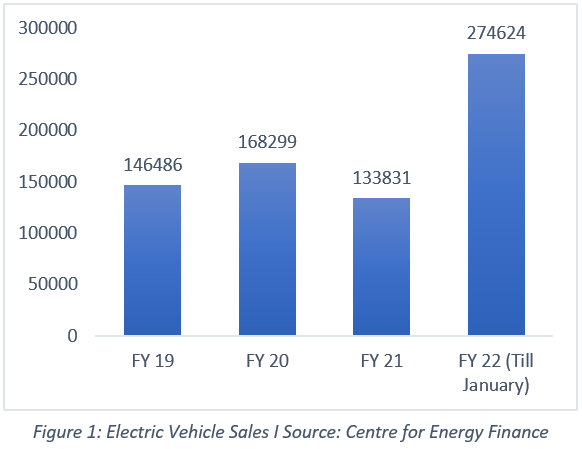Budget 2022: Government to roll out battery swapping policy for EVs
Electric Vehicles slowly getting into priority list of the Government
Qasim Saif | Manager <finserv@vinodkothari.com>
With a growth of more than 100% in sales of Electric vehicles (EVs) from FY21 to FY22 and 9,13,532 EVs currently registered since FY12 and expected sales of 14.8 million EVs by FY30, a comprehensive framework and government support to the industry is no longer an option rather a necessity.
EVs are expected to play a sizeable role in assisting India, achieve its global commitments to reduce carbon emissions by 1 billion tonnes by 2030 and well as provide an opportunity to develop a new industry to support India’s economic growth.
The Budget 2022-23 though did not make any specific declaration for the EV sector, the Hon’ble Finance Minister in her speech stated that;
“Considering the constraint of space in urban areas for setting up charging stations at scale, a battery swapping policy will be brought out and inter-operability standards will be formulated. The private sector will be encouraged to develop sustainable and innovative business models for ‘Battery or Energy as a Service’. This will improve efficiency in the EV eco-system. “
Electric vehicle battery swapping is a part of ‘Battery as Service’ business model in which an electric vehicle’s discharged battery or battery pack can be immediately swapped for a fully charged one, eliminating the delay involved in waiting for a vehicle’s battery to charge.
The Budget promised a battery swapping policy; specifics of the policy or when it would be introduced have not been disclosed at this stage.
A major constrain in the proposed structure would be different model of battery used in each vehicle and hence, a workable battery swapping structure to be implemented, getting all manufacturers to adopt a uniform standard will be key. Though some market players are already offering such services those are restricted to specific vehicles only. Hence, for a wider adoption, a more comprehensive approach would be necessary.
Though not mentioned in the Budget, the battery swapping model is likely to be aimed at two and three wheeler manufactures given that their battery sizes are more amenable and easier for quick swapping as compared to other larger vehicles. Also, the Ministry of Road Transport and Highways permitted sale of two and three wheelers without a fitted battery, in order to assist battery as service models. We had previously discussed ‘Battery as Service Model’ in detail in one of our write-ups which can be read at this link https://vinodkothari.com/2021/11/financing-electric-mobility-evaluating-baas-structures/


Leave a Reply
Want to join the discussion?Feel free to contribute!